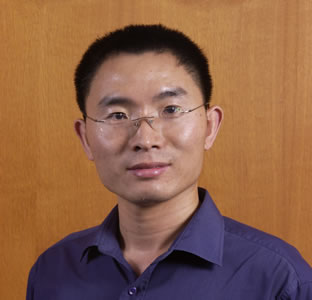Computer science professor Dakai Zhu receives $400K NSF CAREER Award

Dakai Zhu

Dakai Zhu
(Sept. 30, 2010)--Dakai Zhu, UTSA assistant professor of computer science, has received a five-year, $400,000 Faculty Early Career Development (CAREER) award from the National Science Foundation (NSF) to research how multi-core processors can be used to develop smart car technology.
The CAREER award goes to junior faculty members who embody the role of teacher and scholar by integrating teaching excellence with outstanding research. Zhu is the fifth faculty member in the UTSA Department of Computer Science to receive the award.
"CAREER awards are extremely competitive and are given to junior researchers who show significant promise in their areas of research expertise," said George Perry, dean of the UTSA College of Sciences. "Professor Zhu's award is the fifth in a row received by our Department of Computer Science, which demonstrates that the department is flourishing as UTSA grows toward Tier One status."
Zhu, who joined the Department of Computer Science in 2005, specializes in scheduling theory, real-time systems, low-power computing and parallel and distributed systems. The CAREER award will fund his research on the scheduling theory of real-time computing systems. While computer processors work well individually in computers, cell phones and other electronic gadgets, combining them in a complex system like an automobile poses many challenges. Zhu will study ways to ensure that each processor in a multi-core system completes its required tasks in the proper sequence and amount of time. He also will study ways to determine if each processor in a multi-core system is working at maximum capacity.
Zhu's research has significant applications for vehicles with smart technology. Examples currently on the market include vehicles that parallel park themselves or warn their drivers of an obstacle. The technology also is used to control anti-lock brakes and the fuel injection system. Zhu, however, envisions that research like his will contribute to the development of the ultimate smart vehicle, one that will drive itself while properly navigating obstacles or detecting the distance to another car to help avoid collisions.
Previous UTSA recipients of NSF CAREER awards include UTSA computer science professors Jeffery Von Ronne (2009), Qing Yi (2008), Carola Wenk (2007) and Daniel Jimenez (2006), as well as engineering professors Yufei Huang (2005) and Hai-Chao Han (2007).
Events
The UTSA Office of Undergraduate is proud to celebrate National Undergraduate Research with an annual event sponsored by the (OUR) featuring students will showcase undergraduate student research and creative endeavors from all disciplines across campus.
Various LocationsDía en la Sombrilla, formerly Fiesta UTSA, is a festival hosted each spring as a part of Fiesta® San Antonio events. Sponsored by Roadrunner Productions, the event features music, food, confetti, games, event t-shirts, and more.
Sombrilla Plaza and Central Plaza, Main CampusFiesta Arts Fair features contemporary art from more than 100 artists from across the U.S., Fiesta favorite foods, drinks, live music by local and regional performers, and a Young Artists Garden providing opportunities for budding artists to learn, explore and express their creativity.
UTSA Southwest CampusJoin the PEACE Center and Wellbeing Services for Denim Day, a day of learning about the importance of consent and why we wear denim on the last Wednesday of the month each April during Sexual Assault Awareness Month. Stop by our Denim Day display to take a photo in front of our Denim Wall, spin the "Is It Consent?" Wheel, and get a Concha or goodie.
Student Union Window Lounge, Main CampusLearn to use Zotero®, a citation manager that can help you store and organize citations you find during your research. Zotero can generate bibliographies in various styles, insert in-text citations and allow you to share sources with collaborators.
Virtual EventThis event is to achnowlege the graduating seniors and induct the new cohart of scholars to our program.
North Paseo Building (NPB 5.140,) Main CampusCelebrate the accomplishments of College of Education and Human Development, College for Health, Community and Policy, College of Sciences and University College.
Alamodome

